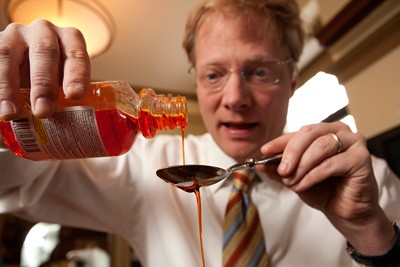Spoonful of medicine makes the measurements go daffy
By Susan S. Lang
Using kitchen spoons to measure liquid medication tends to lead to significantly over- or underdosing, reports a new Cornell study.
Although spoon dosing is one of the major causes of pediatric poisonings, according to the Mayo Clinic, 70 percent of people who take liquid medicine use silverware spoons to measure doses.
In the Cornell study, almost 200 college students who had recently visited their university health center were asked to pour liquid medication into a kitchen spoon.
The researchers found that the students underdosed by more than 8 percent when using medium-size spoons and overdosed by an average of almost 12 percent -- but up to 20 percent more -- when using larger spoons. Yet, participants were confident that they had poured correct doses in all the test cases.
"Although these educated participants had poured in a well-lit room after a practice pour, they were unaware of their biases," said consumer behavior expert Brian Wansink, who led the study.
His findings are published in the Jan. 5 issue of the Annals of Internal Medicine (152:1).
Over the course of a day -- taking medication every four to six hours -- or over days, this error in dosing adds up, he said.
"It can lead to overdosing -- or underdosing -- potentially beneath the point of effectiveness," said Wansink. He added that the college-student study participants poured the medication in midday when well rested in a well-lighted room.
"But in the middle of night, when you're fatigued, feeling miserable or in a rush because a child is crying, the probability of error is undoubtedly much greater," he said.
Since a medicine's efficacy is often linked to its dose, consumers should use a measuring cap, dosing spoon, measuring dropper or a dosing syringe "rather than assume they can rely on their pouring experience and estimation abilities with tablespoons," concluded Wansink.
Koert van Ittersum of Georgia Tech's College of Management co-authored the study.
Media Contact
Get Cornell news delivered right to your inbox.
Subscribe